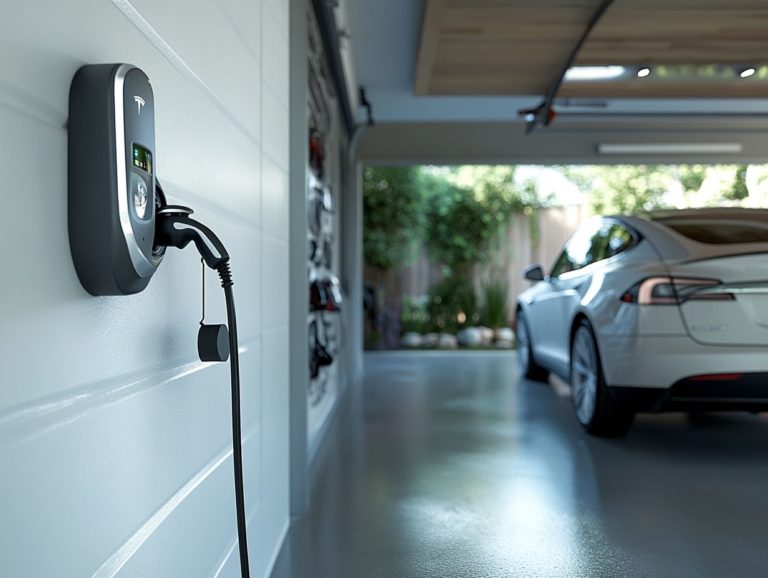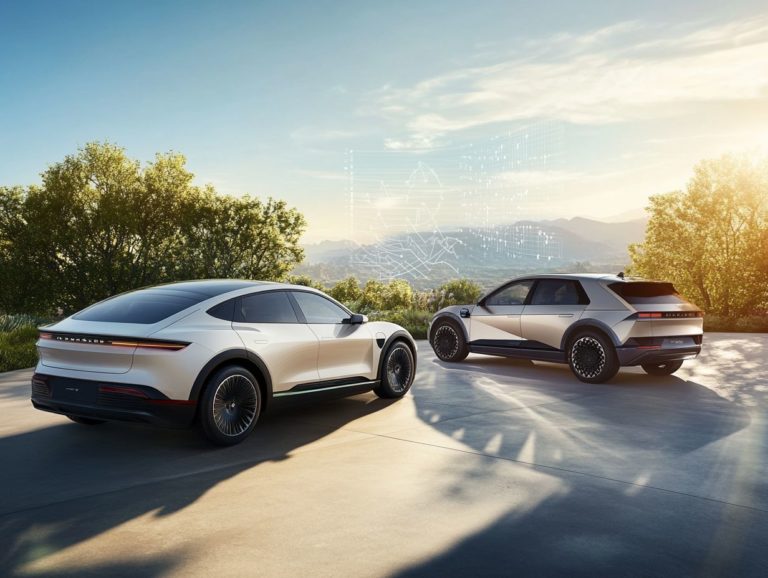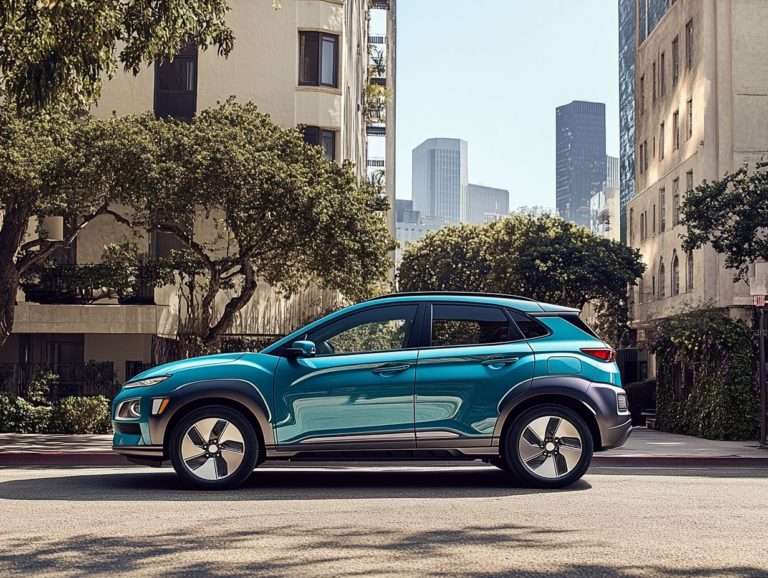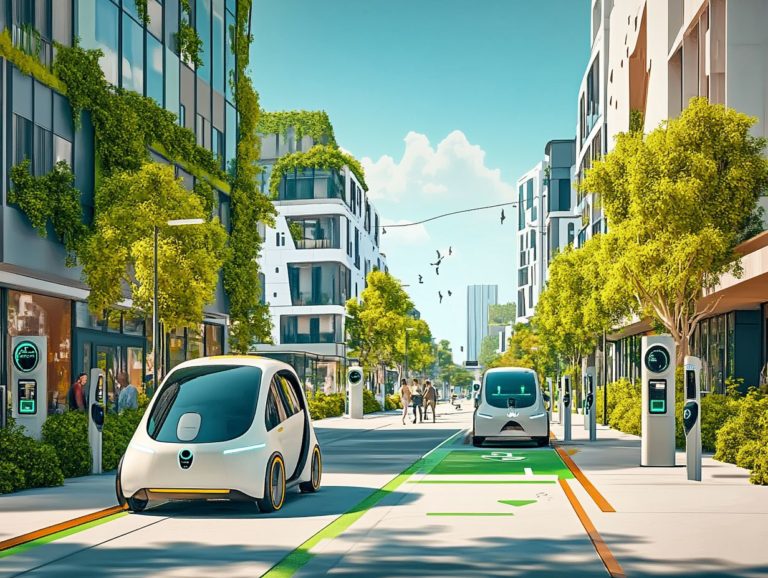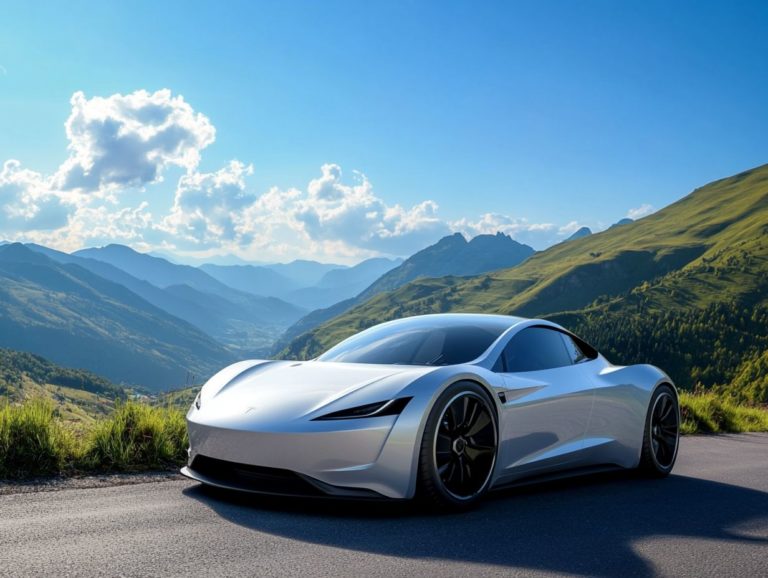5 Myths About Electric Cars Debunked
Electric cars are a hot topic today. Many people are excited to adopt this new technology, but misconceptions often complicate the conversation.
This article addresses five prevalent myths surrounding electric vehicles, covering aspects such as speed, range, environmental impact, and safety features. It delves into the real facts behind these assertions and showcases the myriad advantages of owning an electric car.
Are you ready to discover the truth about electric cars? Let s dive in!
Contents
- Key Takeaways:
- 1. Electric Cars Are Slow and Have Limited Range
- 2. Electric Cars Are More Expensive Than Gasoline Cars
- 3. Electric Cars Are Not Environmentally Friendly
- 4. It’s Difficult to Find Charging Stations for Electric Cars
- 5. Electric Cars Are Not Safe
- What Are the Benefits of Owning an Electric Car?
- Frequently Asked Questions
Key Takeaways:
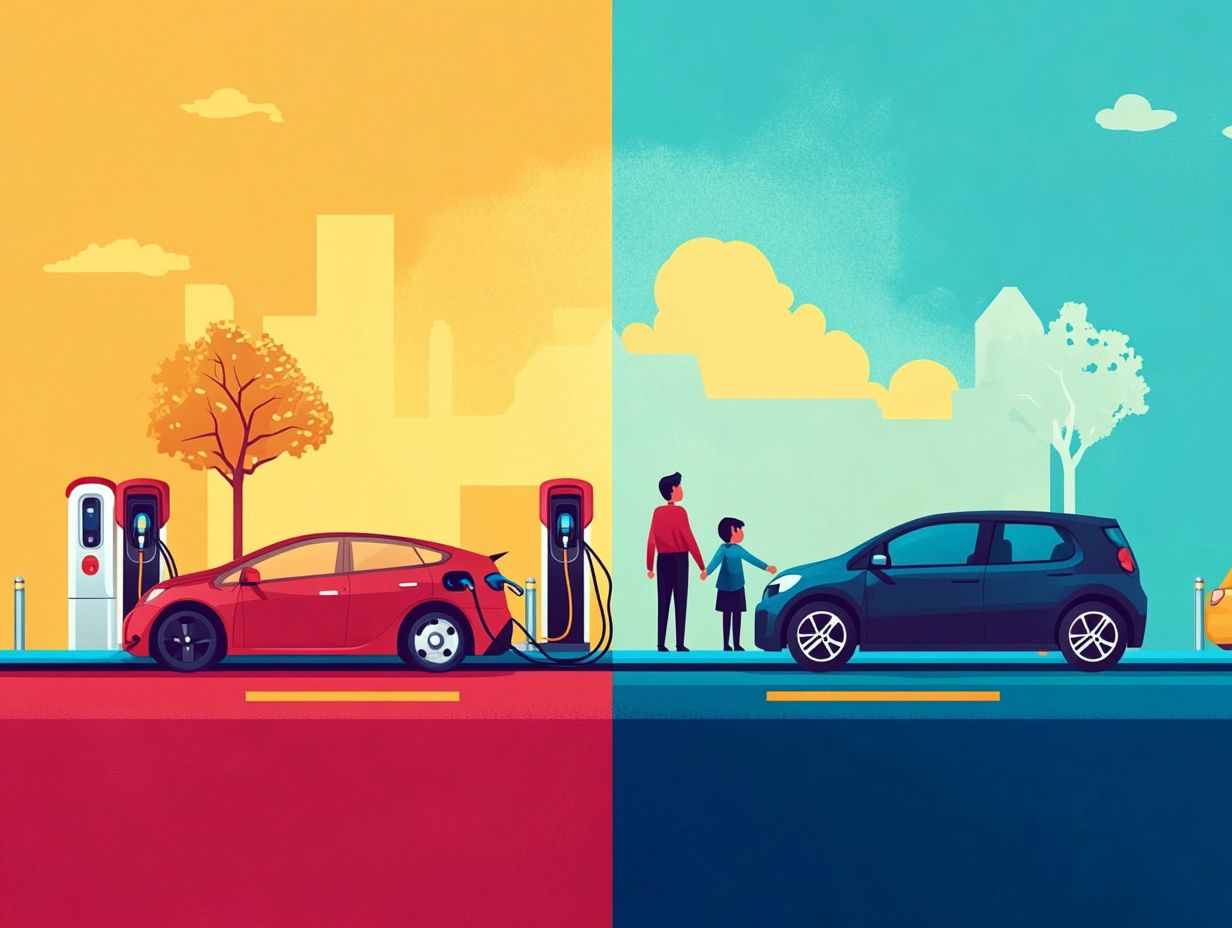
- Electric cars are just as fast and have a similar range as gasoline cars, with some models even surpassing their gas counterparts.
- While electric cars may have a higher upfront cost, the long-term savings in maintenance and fuel costs make them a more cost-effective option.
- Contrary to popular belief, electric cars have a significantly lower carbon footprint and contribute to cleaner air and a healthier environment.
1. Electric Cars Are Slow and Have Limited Range
Electric vehicles (EVs) have long been boxed into the perception of being slow and limited in range, but new technology in cars is rewriting this narrative. With remarkable models like the Tesla Model S and Chevrolet Bolt EV, you’re now witnessing impressive performance paired with extended driving distances.
These vehicles shatter outdated assumptions: many modern electric cars can rocket from 0 to 60 mph in mere seconds, giving traditional gasoline-powered sports cars a run for their money. However, there are still myths about buying used cars that can mislead potential buyers. Innovations in battery technology have not only extended life cycles but also introduced faster charging capabilities, enabling you to cover greater distances without the frequent stops that once plagued electric models.
Leading manufacturers are consistently enhancing energy efficiency, which translates into a wider array of choices for consumers like you. As a result, today s electric vehicles don t just meet expectations; they often surpass what earlier generations could have dreamed of, paving the way for a sustainable future in automotive travel.
2. Electric Cars Are More Expensive Than Gasoline Cars
While you might notice that electric vehicles come with higher upfront costs compared to gasoline cars, a thorough analysis of the total cost of ownership the total amount you will spend on the car over time, including purchase, maintenance, and fuel costs reveals impressive long-term savings. These savings stem from lower maintenance expenses, reduced fuel costs, and attractive federal incentives often available with EV purchases.
As more states embrace policies aimed at promoting clean energy, you can also take advantage of additional local incentives, further easing your financial commitments. Electric vehicles generally require fewer repairs and less frequent servicing, leading to significant reductions in maintenance costs over time.
When you look at fuel costs, the difference between charging an electric vehicle and filling up a gasoline tank can be quite striking, especially depending on regional electricity rates. Combined, these factors can result in substantial savings throughout the life of the vehicle, making the decision to invest in an electric vehicle all the more appealing.
3. Electric Cars Are Not Environmentally Friendly
Despite facing some criticism, electric vehicles (EVs) stand out as significantly more environmentally friendly than traditional internal combustion engines. They produce lower greenhouse gas emissions throughout their lifecycle, especially when charged with renewable energy and supported by efficient battery recycling practices.
This reduction in tailpipe emissions contributes to cleaner air in urban areas, which is a boon for public health and aids in mitigating climate change. Lifecycle analysis reveals that while the manufacturing of EVs can be resource-intensive, their overall impact is decidedly more favorable compared to gasoline cars, particularly when you account for their operational emissions over time.
As the power grid increasingly embraces solar, wind, and other renewable sources, the carbon footprint linked to charging electric vehicles shrinks considerably. This evolution positions EVs not just as a cleaner choice for today, but as a more sustainable option for the future.
4. It’s Difficult to Find Charging Stations for Electric Cars
Finding charging stations for electric cars used to be a real hassle. However, recent infrastructure investments have dramatically improved the situation. Now, it s much easier for you to recharge your vehicle, especially in urban areas and along major highways.
This transformation is driven by a mix of government initiatives and private investments. As a result, there has been a surge in public charging stations equipped with fast-charging capabilities. The emergence of various charging technologies, like Level 2 and DC fast chargers, allows for quicker recharging.
Now, you can enjoy greater convenience whether you’re at home, at work, or on the road. This effectively reduces range anxiety and fosters a cleaner, greener future. With more charging options available, the overall adoption of electric vehicles is also gaining momentum.
5. Electric Cars Are Not Safe
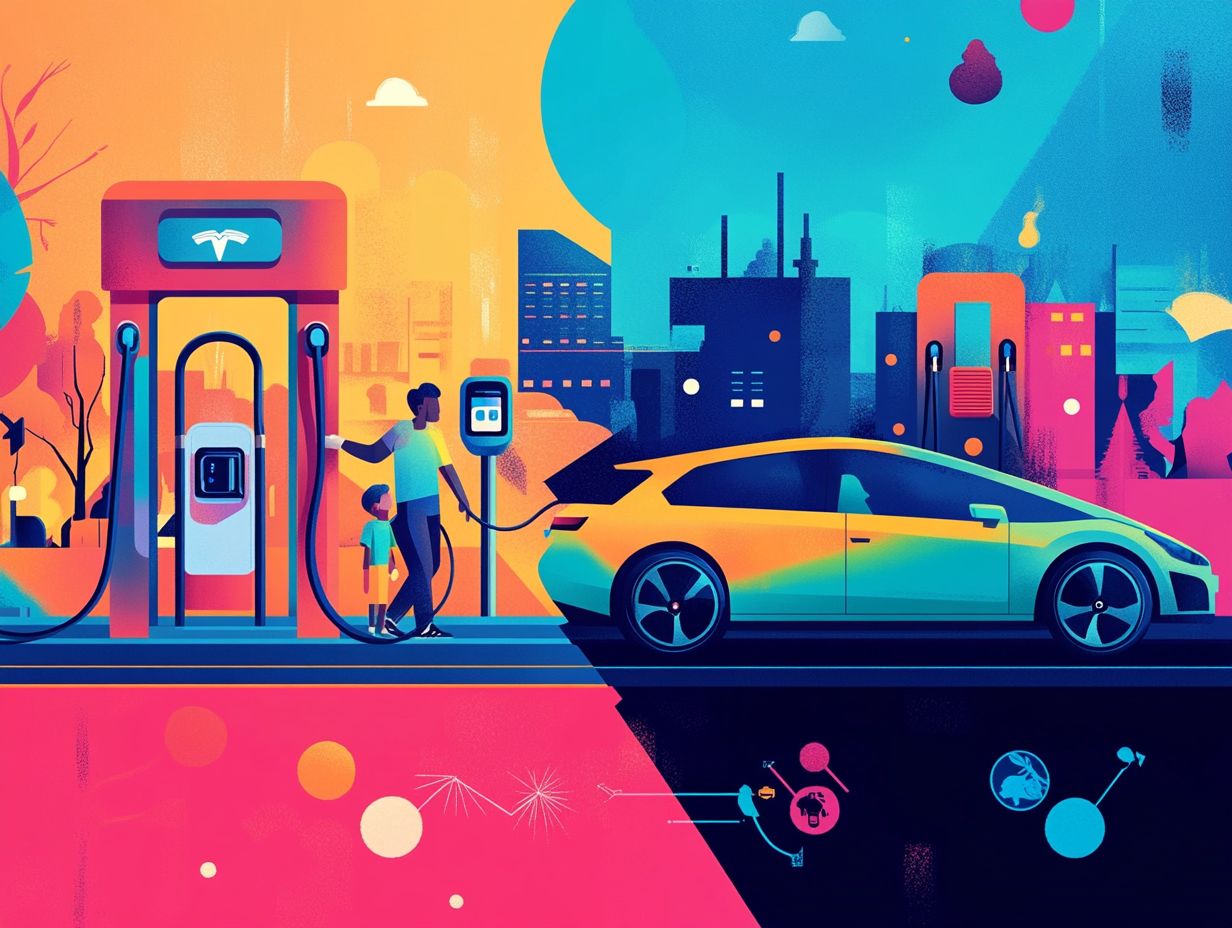
Contrary to what you might have heard, electric vehicles are engineered to meet stringent safety standards and often surpass gasoline cars in crash tests. They incorporate advanced driver assistance systems that significantly enhance overall vehicle safety and protect occupants.
These vehicles undergo rigorous testing against the Federal Motor Vehicle Safety Standards. This ensures they provide exceptional occupant protection in different types of accidents. Features like automatic emergency braking, lane departure warnings, and adaptive cruise control assist in preventing accidents and add crucial layers of safety for your everyday driving experience.
You ll be amazed to find out that many of these cutting-edge technologies can be more effective at reducing the severity of collisions than traditional systems. This reflects the commitment of electric vehicle manufacturers to prioritize the well-being of both passengers and pedestrians.
What Are the Benefits of Owning an Electric Car?
Owning an electric car presents you with a multitude of advantages, from reduced emissions to lower operating costs. However, if you’re considering financing options, it’s important to debunk any misconceptions. Check out the top 5 leasing myths busted for new car buyers to make informed decisions. This allows you to contribute meaningfully to climate change efforts by embracing sustainable vehicle technology and energy-efficient driving practices.
By transitioning from traditional gasoline vehicles, you actively diminish your carbon footprint. This plays a vital role in the fight against global warming. Leveraging renewable energy sources to power your electric car amplifies this positive impact, lessening your reliance on fossil fuels that pollute the air.
Electric vehicles significantly cut maintenance costs due to their fewer moving parts and the absence of oil changes. This offers you both economic savings and a chance to contribute to a healthier planet. As electric vehicle adoption gains traction, it fosters the development of more green technologies and infrastructure, paving the way for a more sustainable future.
How Do Electric Cars Compare to Gasoline Cars in Terms of Performance?
When you compare performance metrics, electric cars often leave gasoline cars in the dust. They excel in areas like acceleration and torque. With advancements in battery manufacturing, they also enjoy enhanced driving range and overall efficiency.
Take models like the Tesla Model S and the Porsche Taycan, for example. They showcase astonishing acceleration rates, often going from 0 to 60 mph in under three seconds. This feat is hard for traditional combustion engines to match. The instant torque available in electric vehicles offers an exhilarating driving experience that conventional cars simply can t replicate.
Thanks to breakthroughs in battery technology, energy density has improved. This enables these electric models to cover longer distances on a single charge, making them increasingly compelling alternatives to gasoline vehicles for your daily driving needs.
What Are the Long-Term Savings of Owning an Electric Car?
The long-term savings from owning an electric car are substantial. You ll enjoy lower maintenance costs, impressive fuel savings, and potential federal incentives.
Electric vehicles typically require less servicing due to their fewer moving parts. This leads to a significant drop in maintenance expenses.
Your fuel costs will also decline dramatically. Electricity prices are generally lower than gasoline. In fact, the U.S. Department of Energy estimates electric vehicles can save you around $800 per year on fuel.
Many states and the federal government offer enticing tax credits. These incentives enhance the overall cost-effectiveness of switching to electric mobility.
With these factors considered, it s clear that meaningful savings accumulate throughout the life of your vehicle.
How Do Electric Cars Impact the Environment?
Electric cars allow you to make a positive environmental impact. They significantly reduce emissions and promote renewable energy use.
Unlike traditional gasoline vehicles, electric vehicles produce zero tailpipe emissions. This shift contributes to cleaner air and better public health.
Using renewable energy sources like solar and wind for charging amplifies these benefits. Powering EVs with clean energy makes them even more sustainable.
When considering the entire production and disposal process, electric vehicles typically have a lower environmental footprint than gasoline cars. This shift is a significant step toward a sustainable transportation future.
What Are the Different Types of Charging Options for Electric Cars?
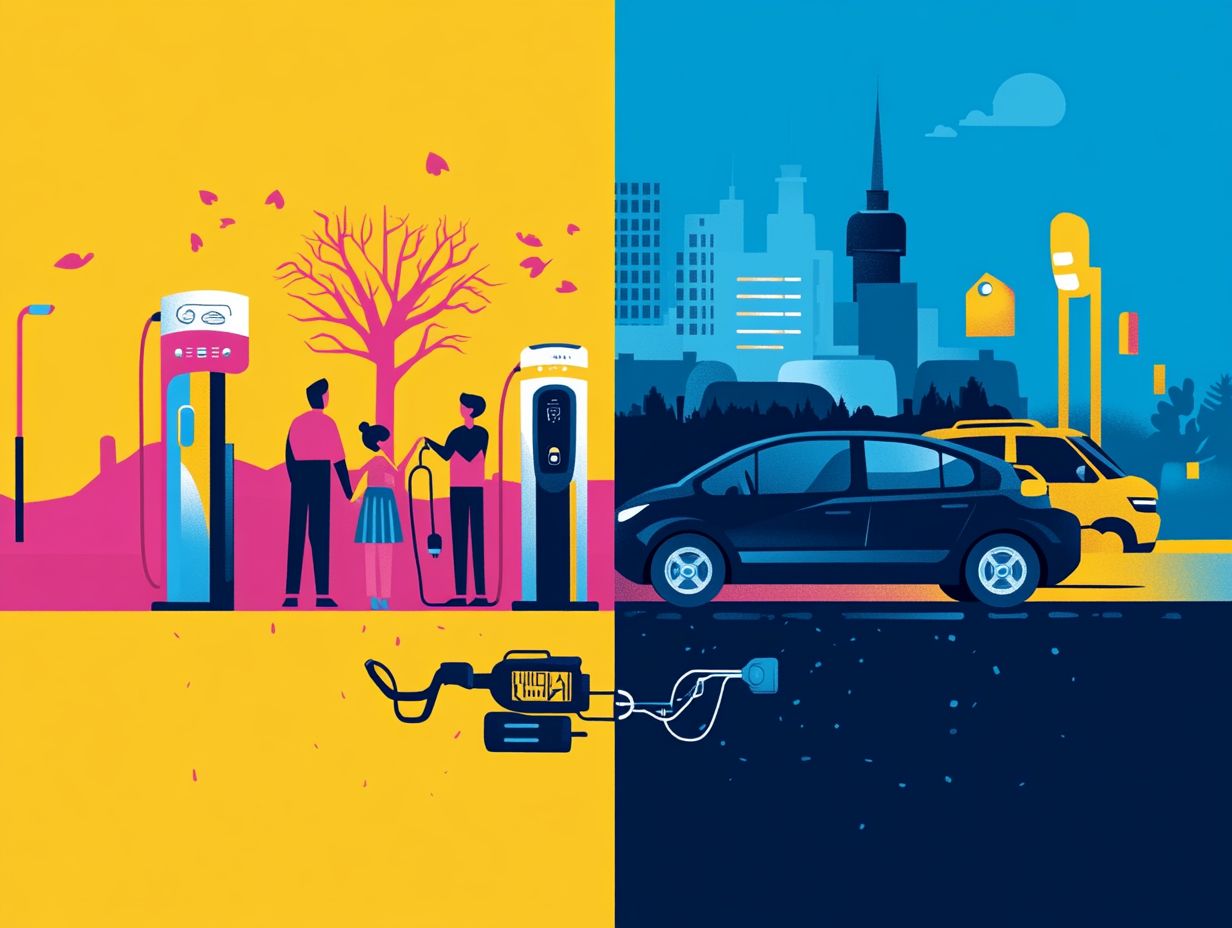
Electric cars offer various charging options, including home charging stations, public charging locations, and fast-charging networks. This variety provides you with the flexibility essential for any EV owner.
Home charging is the most convenient choice. Just plug in overnight, and you ll wake up to a fully charged battery.
Public charging stations are conveniently located in urban areas and along highways. They ensure you have the support needed for longer journeys.
Fast-charging networks minimize downtime. They allow you to recharge quickly during road trips or busy days.
With these options, electric vehicles remain a practical and appealing choice for your daily commutes and extended travels.
What Safety Features Do Electric Cars Have?
Electric cars feature an impressive array of safety features. They include advanced driver assistance systems that meet Federal Motor Vehicle Safety Standards.
These systems help reduce driving risks using cutting-edge technologies. They include automatic emergency braking, which detects potential collisions and applies the brakes if necessary, and adaptive cruise control, which adjusts your speed based on traffic conditions.
Many electric vehicles also have blind-spot monitoring and 360-degree cameras. These features significantly enhance your situational awareness.
These innovations not only meet high safety standards but also show that safety is a paramount concern in the design of today s electric vehicles.
Frequently Asked Questions
What are the top 5 myths about electric cars?
Electric cars have a limited range. They are also more expensive than traditional cars.
Are electric cars only for short distances?
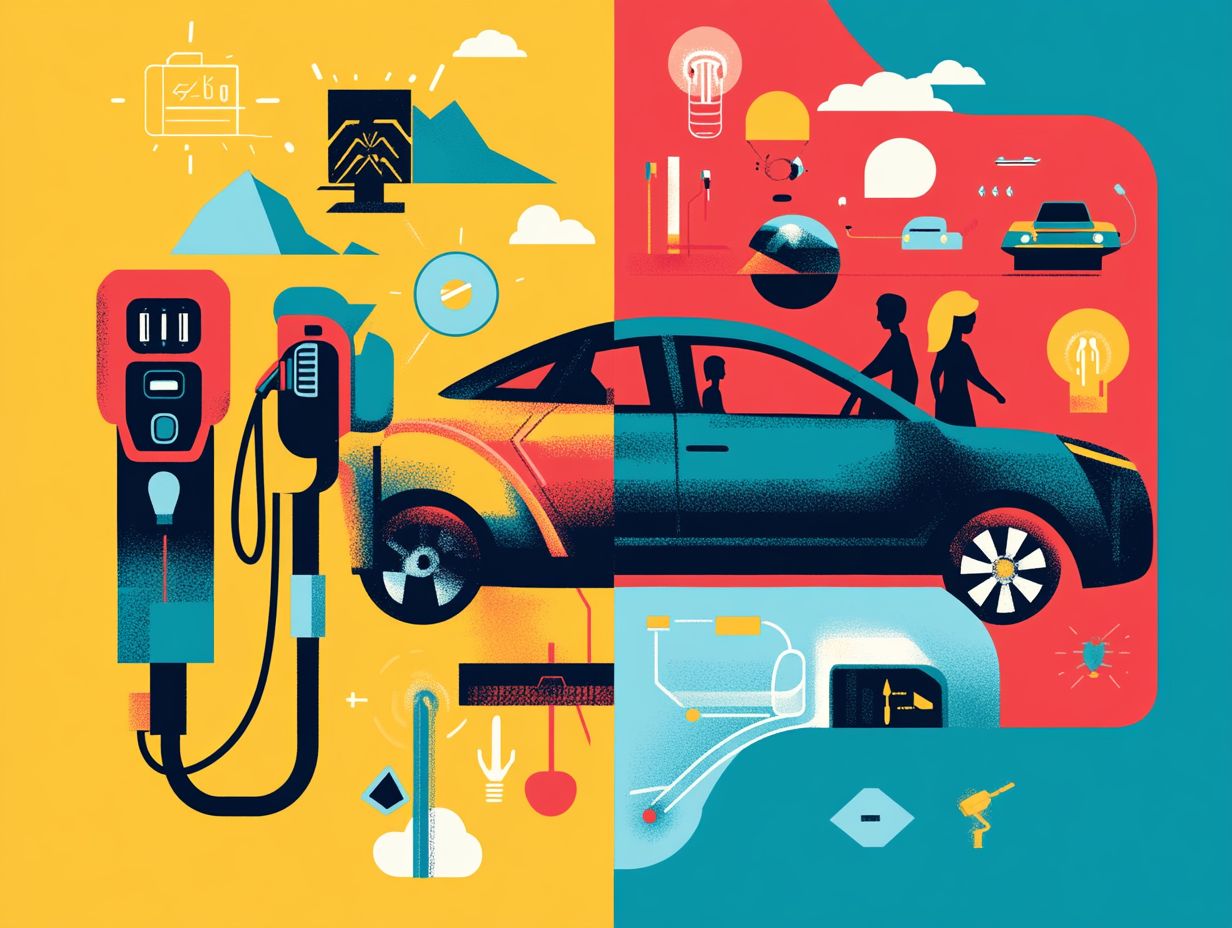
No! Electric cars can travel up to 300 miles on a single charge. They re perfect for long trips!
Do electric cars cost more than traditional cars?
The upfront cost may be higher. However, they have lower operating costs and potential tax incentives.
How long does it take to charge an electric car?
Charging times vary based on the charger type. Most electric cars can fully charge in 4-8 hours with a Level 2 charger, which is commonly available at homes and public locations.
Are electric cars safe?
Absolutely! Electric cars meet the same safety standards as traditional cars. They even have a lower fire risk compared to gas-powered vehicles.
Is it true that electric cars are not environmentally friendly?
Not at all! Electric cars produce zero emissions. They are far more environmentally friendly than traditional cars that emit harmful pollutants.

